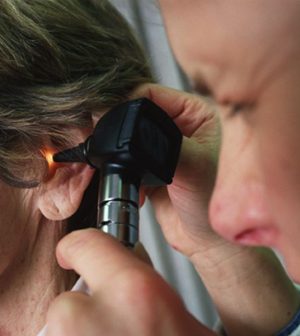- The Best Time of Day to Drink Bone Broth to Maximize Health Benefits
- 8 Ways to Increase Dopamine Naturally
- 7 Best Breads for Maintaining Stable Blood Sugar
- Gelatin vs. Collagen: Which is Best for Skin, Nails, and Joints?
- The Long-Term Effects of Daily Turmeric Supplements on Liver Health
- Could Your Grocery Store Meat Be Causing Recurring UTIs?
- Are You Making This Expensive Thermostat Error This Winter?
- Recognizing the Signs of Hypothyroidism
- 10 Strategies to Overcome Insomnia
- Could Artificial Sweeteners Be Aging the Brain Faster?
Diminished Hearing, Vision Together Could Be Risk Factor for Dementia

A combination of hearing and vision loss is tied to an increased risk of mental decline and dementia, but having just one of those impairments isn’t connected with a higher risk, a new South Korean study finds.
It’s not clear why a diminishing of both senses, but not just one, would raise dementia risks, but the study’s leader had a theory that’s tied to the importance of socializing in keeping the brain sharp.
“Older people with only a visual or hearing impairment can usually still maintain social contact, so they may not feel as isolated or depressed as people who have both impairments,” said Dr. Jin Hyeong Jhoo of Kangwon National University School of Medicine in Chuncheon.
“However, when someone has both impairments, that may increase the risk of isolation and depression, which previous research has found may affect dementia risk and thinking skills later on,” Jhoo explained.
The new study, published online April 7 in Neurology, included 6,520 people, aged 58 to 101, whose visual and hearing impairments were assessed by asking them about their use of glasses or hearing aids.
At the outset of the study, 932 people had normal seeing and hearing, almost 3,000 had either a visual or hearing impairment, and just over 2,600 had both impairments.
In addition, the researchers also found that, at the start of the study, dementia was more than twice as common among people with both impairments (8%) than among those with one impairment (2.4%) or neither impairment (2.3%).
The participants’ memory and thinking skills were also evaluated every two years for six years. During that time, 245 people developed dementia. Of the nearly 2,000 people with both impairments, 146 developed dementia, compared to 69 of about 2,400 people with one impairment, and 14 of the 737 people with no impairments.
After adjusting for factors such as sex, education and income, the researchers concluded that people with both hearing and vision impairment were twice as likely to develop dementia as those with one or neither of the impairments.
The investigators also found that people with both hearing and vision impairment had larger declines on thinking test scores.
“Depending on the degree of hearing or vision loss, losing function in your senses can be distressing and have an impact on your daily life,” Jhoo said in a journal news release. “But our study results suggest losing both may be of particular concern.”
One expert in the United States said the study left many unanswered questions, however. Dr. Darius Kohan directs otology and neurotology at Lenox Hill Hospital and the Manhattan Eye, Ear and Throat Hospital, both in New York City. Reviewing the findings, he said the study was weakened by the fact that it relied on people’s “self reports” of vision or hearing loss (not a clinical exam).
Also, it’s not clear how well the findings would translate to non-Korean populations. “One limitation they do not address is the societal/cultural differences in South Korea versus other countries/cultures in the interaction of family and society to their elderly population,” Kohan said.
Finally, he said that, in the United States and worldwide, a loss of hearing alone has been tied to raised odds for cognitive decline.
“There have been numerous studies all over the world documenting that hearing loss in the elderly promotes isolation, diminished communication and withdrawal from interacting with others, leading to disproportional cognitive decline,” Kohan said.
More information
The American Academy of Family Physicians has more on dementia.
SOURCES: Darius Kohan, MD, director of otology/neurotology, Lenox Hill Hospital and the Manhattan Eye, Ear and Throat Hospital, New York City; Neurology, news release, April 7, 2021
Source: HealthDay
Copyright © 2026 HealthDay. All rights reserved.










